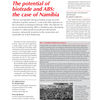The potential of biotrade and ABS: the case of Namibia
The ?Namibian model? shows that developing countries with interesting biodiversity endowments can generate considerable sustainable development benefits by taking pro-active ownership of indigenous biological resources and actively promoting their equitable commercialisation. Namibia?s coordinated, market-responsive approach to biotrade has leveraged significant investments in product development by private sector partners, creating additional natural resources-based incomes to serve as incentives for conservation. Namibia has adopted an innovative, flexible and ?evolution-enabled? sui generis approach to ABS, which uses well-known contract law to provide legal certainty to the users of indigenous resources, thereby enabling the creation of benefits while it facilitates fair benefit-sharing with the providers and traditional owners of those resources.
Dr. Andreas Drews, Dr. Kirsten Probst
Deutsche Gesellschaft für Technische Zusammenarbeit (GTZ) GmbH
Eschborn, Germany
Andreas.Drews@gtz.de
Pierre du Plessies
Centre for Research-Information-Action in Africa / Southern African
Development & Consulting
(CRIAA SA-DC)
Cyril Lombard
Phytotrade Africa




